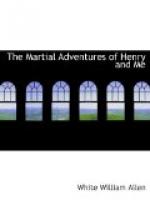That evening at supper in Chalons, we met some American boys who said the French were selling this glass from the windows of Rheims made from old beer-bottles and blue bottles and green bitters bottles, and still later we saw an English Colonel who had bought a job lot of it and found a patent medicine trade mark blown in a piece!
We had been in the place but a few minutes, when we went to the back of the cathedral where we found an excited old man on the sidewalk with a broom in front of a postcard printing office. He spoke to Henry and me, but we could not understand him. He pointed to the stone dust and spawl freshly dropped on the sidewalk and to a hole in the pavement, and then to a broken iron shell. It must have weighed twenty-five pounds. He kept pointing at it, and made it clear we were to touch it. It was still hot! It had dropped in but a few minutes before we came. We went into his shop to stock up on post cards, and as Major Murphy and Mr. Norton, who could talk French, learned that another shell would be due in three or four minutes, we left town.
The road out of Rheims was in full view of the German lines, hidden only, and at that rather poorly, by camouflage—straw woven into mats, and burlap, badly torn. We were between the German guns five miles away, and the sunset. Great holes in the ground beside the road indicated where they had been dropping shells, so our driver tramped on the juice, the machine shot out at fifty miles an hour and we skedaddled.
From the road out of Rheims we dropped into the valley of the Marne, a most beautiful vine-clad valley, where the road turns sharply from the German lines and soon passes out of the German range and the shell holes at the side of the road disappear. But even shell holes would not have taken our eyes from the beauty of that valley as we wound down into it from the hill. Vines were everywhere. Rows and rows of vines, marking a thousand brownish green lines in the earth as far as the eye could see. The grapes were ripe and they gave a tint of purple and brown to the landscape. It glowed with colour. Half a score of little grey, red roofed towns dotted the checkered fields.




